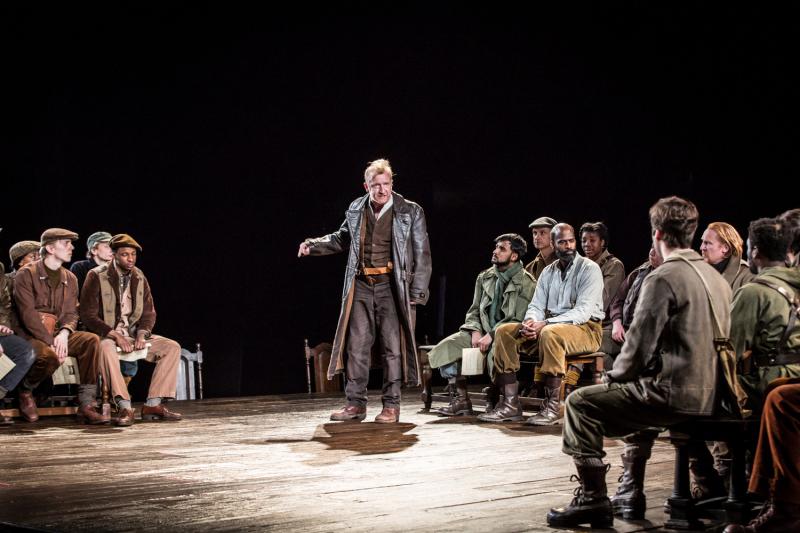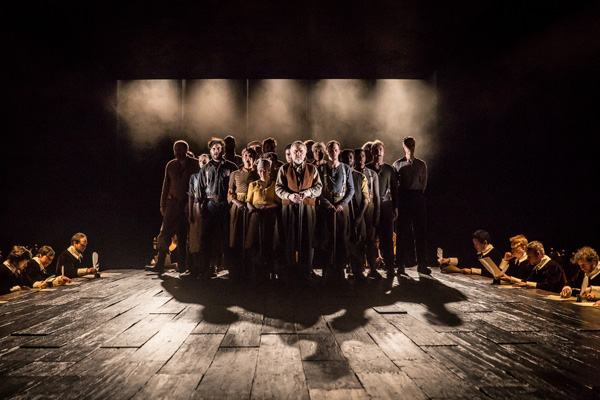Light Shining in Buckinghamshire, National Theatre | reviews, news & interviews
Light Shining in Buckinghamshire, National Theatre
Light Shining in Buckinghamshire, National Theatre
Revival of Caryl Churchill’s 1976 play about radicals in the English Civil War is an acquired taste

The trouble with the general election is that while everybody talks about money, nobody talks about ideas. We know the price of everything, but the value of nothing. This might seem to be a triumphant demonstration of the essential pragmatism of the nation, yet there was a time in English history when ideas mattered. And when they were passionately discussed, and bitterly fought over.
Now revived in a large-scale production by Lyndsey Turner, Light Shining in Buckinghamshire offers a series of snapshots of events during those turbulent years when the English Revolution threatened to turn the world upside down. As civil war destroyed law and order, the sudden absence of authority allowed a huge variety of Levellers, Diggers and Ranters; preachers, agitators and chancers; radical soldiers, poor peasants and wandering beggars, the opportunity to make their voices heard.
The past, however strange, can
still speak to us
Instead of showing the battles of the great and the good, Churchill focuses on all the people that lived, struggled and fought in the wings. As such, the play deals a body blow to the idea that the civil war was just about Cavaliers and Roundheads, and shows history from the point of view of the underdogs, for whom events were as much about class war as about bringing down the monarchy.
There are two highpoints: during the great Putney Debates of 1647, the low-class political radicals took on their masters and commanders in a discussion about voting rights and social justice, with the Levellers arguing in favour of universal manhood suffrage while army leaders such as Oliver Cromwell and Henry Ireton supported the status quo. As the theme of a revolution betrayed unwinds – and Cromwell, onetime revolutionary soldier, turns into the imperialist grandee who subjugates Ireland – the play sympathises with the grassroots idealists, such as Rainborough, Sexby and Wildman.
The second highpoint is when the Diggers, led by Gerald Winstanley, occupy St George’s Hill near Weybridge with the intention of owning property in common and working together on the soil. Such scenes are a timely reminder that some traditions can be resonant, and that, however strange, the past can still speak to us today. This communitarian aspect is helped by the fact that the play’s multiracial cast is joined by members of the National Theatre’s Community Company, who fill the stage with their songs and hymns.
Since, from a Marxist perspective, the 17th century marks not only the origins of capitalist work discipline but also sexual repression, Churchill carefully gives some of her female characters a feminist voice. The concentration on the underdog results in a riot of ideas, expressed in the religious jargon of the time, and a glorious feeling of what it must have been like to live during a time of rapid social and political change: from angry clashes with sanctimonious piety to millenarian fantasies that crash into bitter disillusionment.
 But beware. If you don’t already know the difference between Seekers and Shakers – or have a pretty good grasp of 17th-century history – this play is liable to go well over your head. The production’s eclectic mix of costumes suggests a long heritage, one that animated the late Tony Benn and inspires the current Billy Bragg. It is also worth pointing out that the 17th-century Freeborn Englishman (the Scots, Welsh and Irish don’t get a look in) now comes across as atrociously insular, xenophobic and obsessed with God.
But beware. If you don’t already know the difference between Seekers and Shakers – or have a pretty good grasp of 17th-century history – this play is liable to go well over your head. The production’s eclectic mix of costumes suggests a long heritage, one that animated the late Tony Benn and inspires the current Billy Bragg. It is also worth pointing out that the 17th-century Freeborn Englishman (the Scots, Welsh and Irish don’t get a look in) now comes across as atrociously insular, xenophobic and obsessed with God.
Turner’s staging, beautifully designed by Es Devlin, features an enormous oak table, at which the rich gentry and churchmen feast at the start of the play but are usurped by parliamentarian lawyers and scribes by the end (the privileged winners writing history). From a huge cast (pictured above), I liked Sargon Yelda (Rainborough), Steffan Rhodri (Sexby), Daniel Flynn (Cromwell), Leo Bill (Ireton), Joshua James and Trystan Gravelle. Alan Williams plays a variety of down and outs. Elizabeth Chan and Ann Ogbomo suffer the agonies of poverty. This drama of ideas also, occasionally, engages the emotions.
rating
Buy
Share this article
Add comment
The future of Arts Journalism
You can stop theartsdesk.com closing!
We urgently need financing to survive. Our fundraising drive has thus far raised £49,000 but we need to reach £100,000 or we will be forced to close. Please contribute here: https://gofund.me/c3f6033d
And if you can forward this information to anyone who might assist, we’d be grateful.

Subscribe to theartsdesk.com
Thank you for continuing to read our work on theartsdesk.com. For unlimited access to every article in its entirety, including our archive of more than 15,000 pieces, we're asking for £5 per month or £40 per year. We feel it's a very good deal, and hope you do too.
To take a subscription now simply click here.
And if you're looking for that extra gift for a friend or family member, why not treat them to a theartsdesk.com gift subscription?
more Theatre
 Get Down Tonight, Charing Cross Theatre review - glitz and hits from the 70s
If you love the songs of KC and the Sunshine Band, Please Do Go!
Get Down Tonight, Charing Cross Theatre review - glitz and hits from the 70s
If you love the songs of KC and the Sunshine Band, Please Do Go!
 Punch, Apollo Theatre review - powerful play about the strength of redemption
James Graham's play transfixes the audience at every stage
Punch, Apollo Theatre review - powerful play about the strength of redemption
James Graham's play transfixes the audience at every stage
 The Billionaire Inside Your Head, Hampstead Theatre review - a map of a man with OCD
Will Lord's promising debut burdens a fine cast with too much dialogue
The Billionaire Inside Your Head, Hampstead Theatre review - a map of a man with OCD
Will Lord's promising debut burdens a fine cast with too much dialogue
 50 First Dates: The Musical, The Other Palace review - romcom turned musical
Date movie about repeating dates inspires date musical
50 First Dates: The Musical, The Other Palace review - romcom turned musical
Date movie about repeating dates inspires date musical
 Bacchae, National Theatre review - cheeky, uneven version of Euripides' tragedy
Indhu Rubasingham's tenure gets off to a bold, comic start
Bacchae, National Theatre review - cheeky, uneven version of Euripides' tragedy
Indhu Rubasingham's tenure gets off to a bold, comic start
 The Harder They Come, Stratford East review - still packs a punch, half a century on
Natey Jones and Madeline Charlemagne lead a perfectly realised adaptation of the seminal movie
The Harder They Come, Stratford East review - still packs a punch, half a century on
Natey Jones and Madeline Charlemagne lead a perfectly realised adaptation of the seminal movie
 The Weir, Harold Pinter Theatre review - evasive fantasy, bleak truth and possible community
Three outstanding performances in Conor McPherson’s atmospheric five-hander
The Weir, Harold Pinter Theatre review - evasive fantasy, bleak truth and possible community
Three outstanding performances in Conor McPherson’s atmospheric five-hander
 Dracula, Lyric Hammersmith review - hit-and-miss recasting of the familiar story as feminist diatribe
Morgan Lloyd Malcolm's version puts Mina Harkness centre-stage
Dracula, Lyric Hammersmith review - hit-and-miss recasting of the familiar story as feminist diatribe
Morgan Lloyd Malcolm's version puts Mina Harkness centre-stage
 The Code, Southwark Playhouse Elephant review - superbly cast, resonant play about the price of fame in Hollywood
Tracie Bennett is outstanding as a ribald, riotous Tallulah Bankhead
The Code, Southwark Playhouse Elephant review - superbly cast, resonant play about the price of fame in Hollywood
Tracie Bennett is outstanding as a ribald, riotous Tallulah Bankhead
 Reunion, Kiln Theatre review - a stormy night in every sense
Beautifully acted, but desperately grim drama
Reunion, Kiln Theatre review - a stormy night in every sense
Beautifully acted, but desperately grim drama

Comments
This is comfortably the worst
It seems to me over the last
I am middle aged, middle
I agree... an utterly tedious
The dullest play I've ever